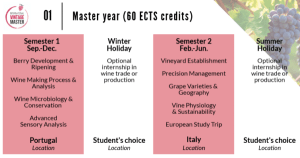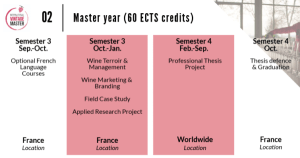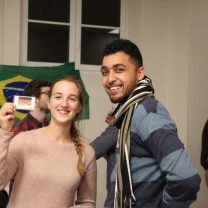International Vintage Master’s curriculum
During the first and second semester, the teaching curriculum provides students the opportunity to acquire and develop knowledge and skills across the following key areas of:
- Berry Development & Ripening
- Wine Making Process & Analysis
- Wine Microbiology
- Wine Conservation & Stabilisation
- Advanced Sensory Analysis & Tasting
- Vineyard Establishment & Precision Vineyard Management
- Grape Varieties & Geography
- Vine Physiology & Sustainability
- European Viticulture Study Trip
The first semester (S1) takes place in Vila Real (Portugal), from September to December, and the second semester (S2) from February to June, in Piacenza (Italy).
The first year ends with a 2-week study trip in two European wine producing countries, which changes each year on committee’s decision. This study trip is dedicated to visiting wine producers in different regions, allowing students to learn more about local practices and products (quality, typicality, economic and cultural values…).
Winter and Summer internships: at the end of each semester of the first year, students are encouraged to undertake practical internships in wine trade or production. During the winter holiday (6 weeks), students may decide to work in the hosting country, or travel to another country, to work in wine trade or production (e.g. pruning internship). Likewise during the summer holiday (12 to 14 weeks), students may travel to different countries or regions to work, for example, as a harvest or cellar intern in a winery.

The third semester occurs in Angers (France), from October to January. Two weeks before the start of this semester, all non-French speaking students can attend French language lessons. During the third semester, the students will apply their first-year knowledge and skills to:
- Wine Terroir & Management
- Wine Marketing & Branding
- Field Case Studies
- Applied Research Project
Applied field and case studies are essential components of the third semester curriculum, where students will deal with real-life situations from public or private wine companies and organizations. These studies allow students to gain experience in an actual working environment, and gain more insight in the wine industry.
Students will use the third semester to finalize their master thesis projects. Students have to find their own study internships, yet offers from partner universities are regularly sent to students.
The fourth and final semester is devoted to the professional thesis project (30 ECTS credits). This 6-month study internship can take place in a private company, research laboratory or public institution, in any country of choice. The thesis project provides students with an in-depth and hands-on professional experience in the field of viticulture, oenology or wine marketing. Throughout the project, each student is supervised by two advisors, a tutor from the hosting company or structure, and a supervisor from the academic committee. After handing in a written thesis of the research work, the professional project is finalized through an oral dissertation.
The completion of the International Vintage Mater’s programme leads to a National French Master Degree of Science (MSc, French DNM).


